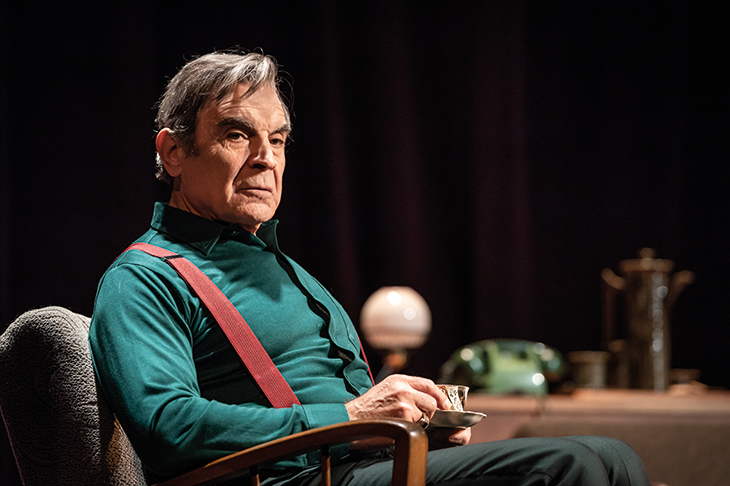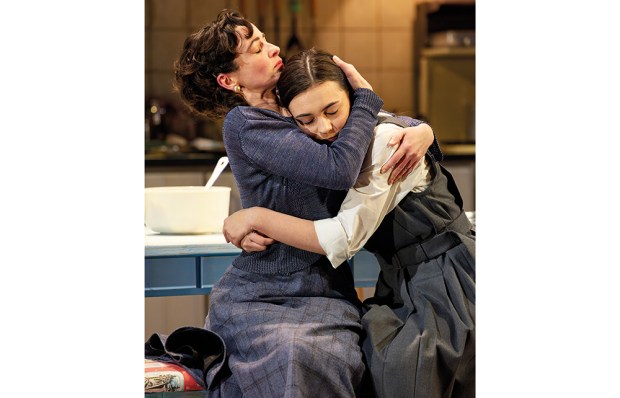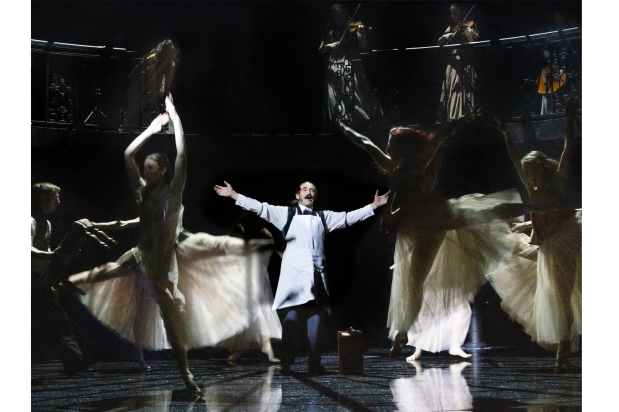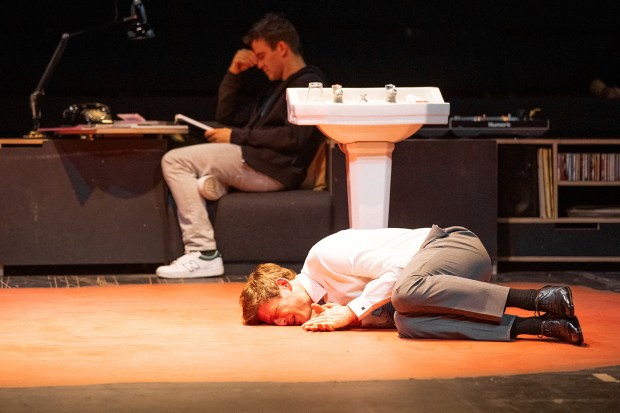Pinter Two, the second leg of the Pinter season, offers us a pair of one-act comedies. The Lover is a surreal pastiche of married life. A suburban housewife has a paramour who visits her daily while her husband is at work. The husband knows of his rival and discusses his wife’s infidelity as if it were a normal aspect of marriage. He toddles off to the office and a little later the lover arrives: it’s the husband. They begin a game of role play. The wife is a whore and the husband is her trick. This neat device dramatises the theory that marriage is prostitution in disguise.
Director Jamie Lloyd presents the show as a paranormal absurdity. Garish pink dominates the couple’s weird, rectilinear home. Pink walls, pink doors, pink shelves, pink everything. The husband and wife speak in clipped uber-posh accents like two robots programmed to imitate stupid toffs. It’s funny enough for a while but Pinter can’t develop the script beyond its opening premise and the cartoonish performances by John Macmillan and Hayley Squires start at maximum volume and have nowhere else to go. A TV version from 1963 (available on YouTube) places the characters in an ordinary house and lets them speak in sober, matter-of-fact tones. This is more disturbing and, in the end, funnier than Jamie Lloyd’s sketch-show production. And because the film stars Vivien Merchant (the first Mrs P.) it probably comes closer to Pinter’s intentions than this frivolous and crudely amusing update.
The Collection is about a gay couple, one elderly, one youthful, whose relationship is threatened by a jealous husband who believes the younger man has been dallying with his wife. The stagecraft is botched — a rarity for Pinter — and the designer has to incorporate two separate households into a single set. It’s awkward rather than disastrous. The script belongs to the early 1960s when homosexuality was illegal and all plays were pre-scrutinised by the priggish Lord Chamberlain. Today, the furtiveness of the male characters and the suggestive innuendo of their dialogue seems puzzling rather than audacious. But audiences in the 1960s would have enjoyed the cheek and cunning of Pinter as he put two gay men on stage with subtle gestures and hints, thereby evading the censor’s veto.
All that remains to us now is an offbeat comedy of manners, full of bizarre wordplay, whose finest asset is David Suchet. He subordinates the entire show to his amazing and rarely seen comic gift. Playing the queeny pensioner he gets huge laughs from unpromising lines by adding a camp tilt of the head and a crooked eyebrow. It’s brilliant, and even balletic at times, if a little selfish. Perhaps his subversive performance is an unconscious verdict on the script, which turns into nonsense in the closing scene when a pivotal character is exposed as a liar. Some overexcitable critics have hailed this feeble ending as a profound comment on the elusiveness of truth and on man’s doomed quest for certainty in this godless and chaotic universe. No. The author couldn’t think of a better twist so he settled for a cop-out.
Pinter Two is an easier ride than the gruelling Pinter One. But don’t be surprised if you leave the theatre feeling that you’ve spent the evening with an eccentric lightweight comic scribbler. These one-act plays lack density and are rarely revived, even in the West End. If you venture out to the shires and to the am-dram playhouses where the capital’s fashionable groupthink holds no sway, you rarely see Pinter performed. They prefer Rattigan and Coward.
Alzheimer’s is a theme that defies dramatisation because a character with no identity is an empty box ringing with meaningless noise. Sharr White’s play The Other Place addresses this problem by making the victim, Juliana, an articulate scientist with no symptoms of dementia at all. She experiences her first brain wobble during a lecture on neurology when she imagines a bikini-clad beauty in the crowd whose lovely figure she wants to scratch and destroy. We meet her husband, suing for divorce, and her difficult daughter whose love life causes her constant anguish.
The intelligence and subtlety of the script are admirable and Claire van Kampen directs with stylish understatement. But the old problem arises when Juliana’s brain-wipe gathers pace and her sense of self collapses. This wrecks the play as art. The central character retreats to the fringes and the fringe characters move to the centre. A bewildered Juliana is rescued by a neighbour whom she doesn’t recognise and this new character assumes an importance she barely merits. The disease’s symptoms cruelly reduce poor Juliana to a whimpering and barely sentient beast, like a dying puppy, and it’s hard to continue sympathising with her. Finally come absurd revelations about the husband and the daughter. But that’s not a play. That’s a swizz.
Got something to add? Join the discussion and comment below.
Get 10 issues for just $10
Subscribe to The Spectator Australia today for the next 10 magazine issues, plus full online access, for just $10.
You might disagree with half of it, but you’ll enjoy reading all of it. Try your first month for free, then just $2 a week for the remainder of your first year.














Comments
Don't miss out
Join the conversation with other Spectator Australia readers. Subscribe to leave a comment.
SUBSCRIBEAlready a subscriber? Log in